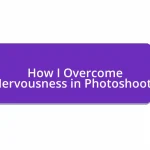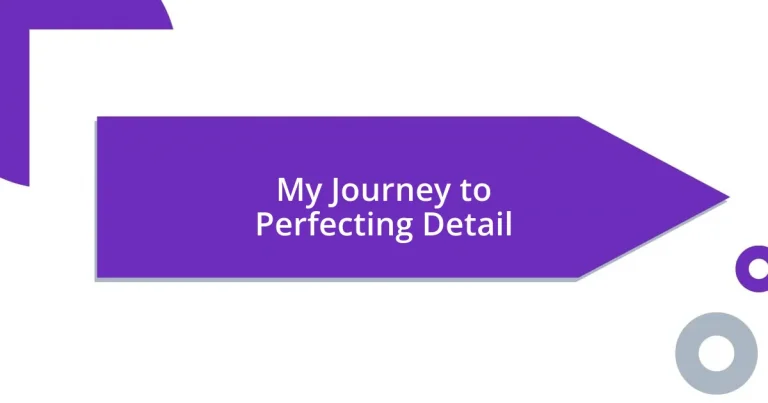Key takeaways:
- Attention to detail is crucial for producing high-quality work, as small oversights can have significant consequences.
- Constructive feedback from others helps identify blind spots and enhances skill development.
- Setting specific and achievable goals fosters a sense of accomplishment and encourages steady progress.
- Practicing mindfulness in daily tasks enhances focus and appreciation for the present moment, leading to increased productivity.
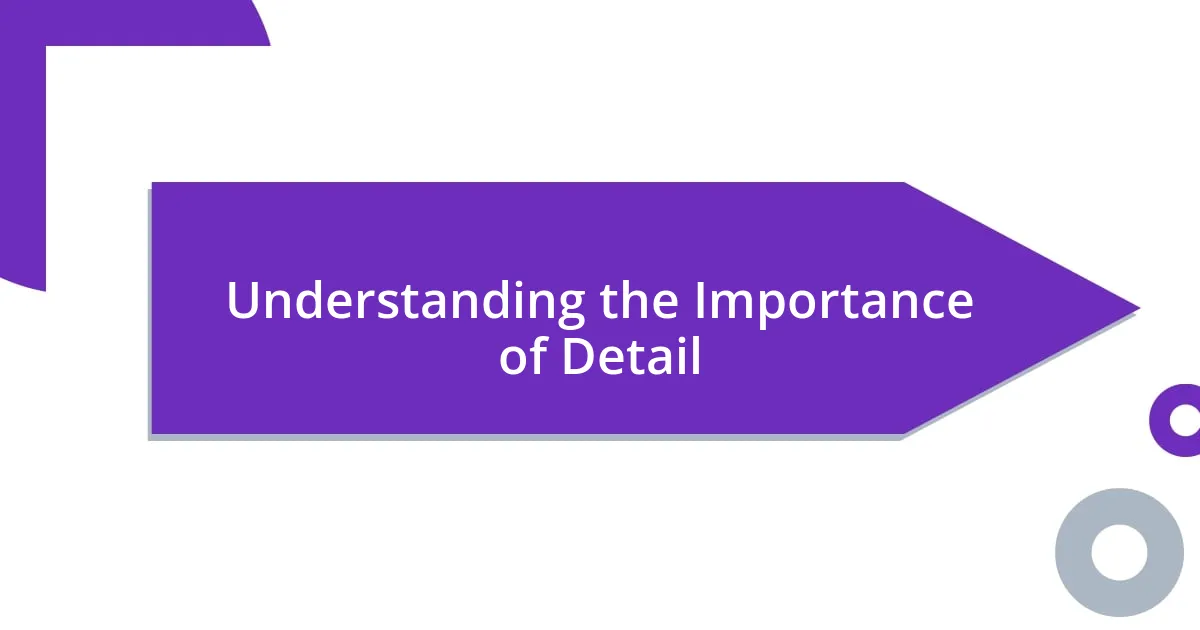
Understanding the Importance of Detail
When I started diving into the world of detail, I realized that it’s like the fine-tuning of a beautiful piece of music. Think about your favorite song—it’s not just the melody that captivates you; it’s the subtle nuances, the background harmonies, and the perfect timing that make it truly magical. Isn’t it fascinating how those tiny details can evoke such strong emotions?
Many times, I found myself overlooking the importance of detail in my projects, only to realize later that the smallest oversight could lead to a big impact. For instance, I once submitted a report riddled with typos; it felt like a personal failure to me. Each small mistake not only affected the document’s clarity, but it also reflected a lack of care. Have you ever experienced that sinking feeling when a detail you dismissed comes back to haunt you?
In my experience, focusing on details fosters a sense of pride in my work. It’s rewarding to see how attention to detail can elevate mediocre projects into something exceptional. I often ask myself, “What would happen if I took that extra moment to refine this?” The answer is always revealing, pushing me to strive for excellence and inspiring those around me to do the same. How can we not be captivated by the power of detail when it has the potential to transform our efforts?
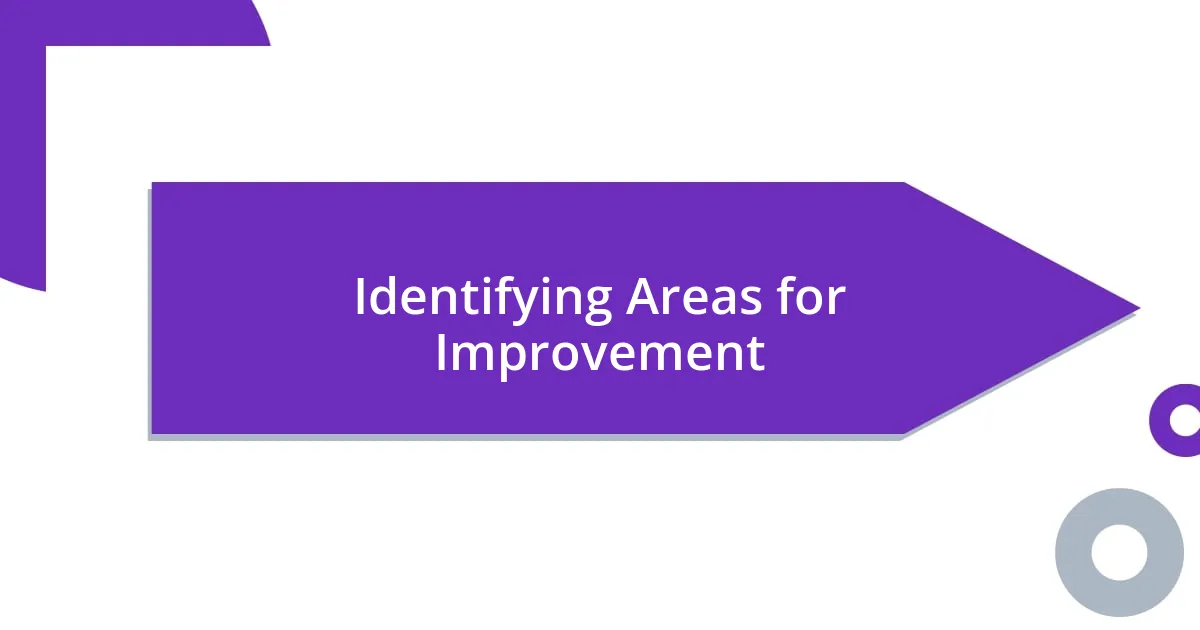
Identifying Areas for Improvement
Identifying areas for improvement requires a critical yet compassionate lens. I often take a step back to evaluate my work honestly. For instance, one time, after completing a project I was proud of, I asked a colleague for feedback. Their insights highlighted a few blind spots I had overlooked, like inconsistent formatting. This experience taught me that constructive criticism can reveal areas I might not see on my own.
Sometimes, it’s helpful to keep an improvement checklist. I find that writing down specific areas where I struggle—like time management or critical feedback—helps me visualize where I can grow. It’s a simple step, but those regular reflections often uncover surprisingly large opportunities for growth. Ever found yourself feeling stuck—only to realize a small adjustment could make a world of difference? I’ve been there; that feeling of realization is both humbling and motivating.
Gathering feedback from others can also illuminate areas that need attention. I remembered a collaboration where my partner pointed out my tendency to rush through the editing phase. I realized my eagerness to complete tasks sometimes overshadowed the quality I aim to deliver. This awareness has significantly shaped my approach, teaching me to savor the process more and focus on the finer details.
| Area for Improvement | Example |
|---|---|
| Time Management | Rushing through tasks leads to missed details. |
| Feedback Reception | Constructive criticism helps identify blind spots. |
| Editing Process | Rushing editing reduces overall quality of work. |
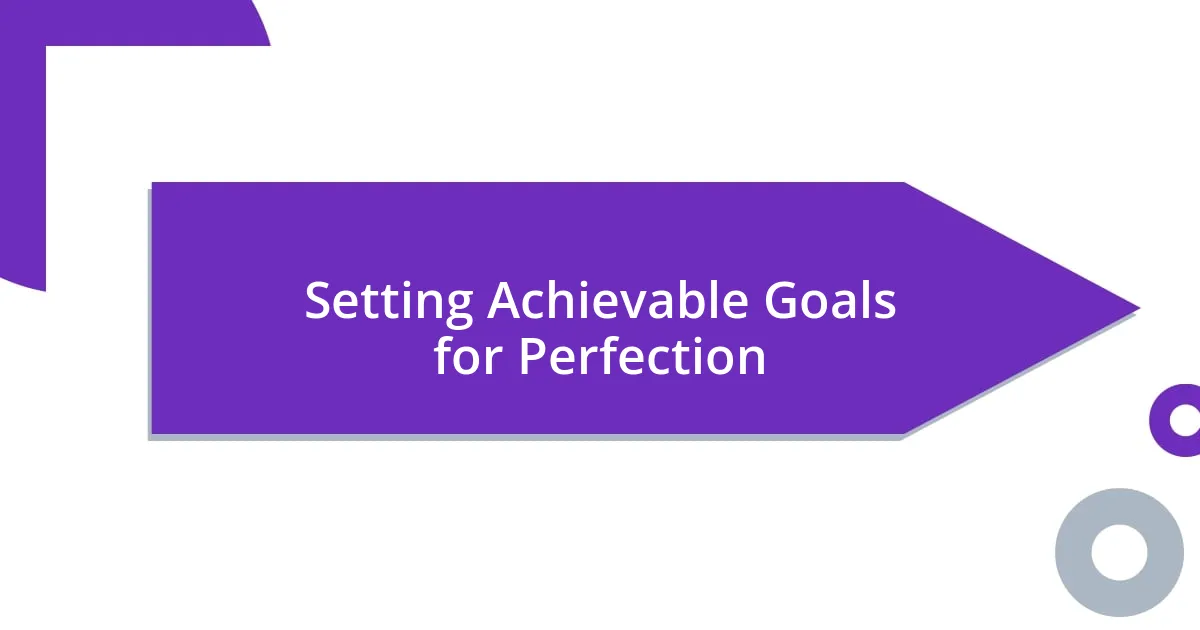
Setting Achievable Goals for Perfection
Setting achievable goals has been a game changer in my pursuit of perfection. I remember a time when I aimed too high too quickly, leading to frustration and burnout. By breaking my ambitions into smaller, more manageable tasks, I found that I gained a sense of accomplishment with each step. It’s astonishing how achieving tiny goals can create a ripple effect, boosting confidence and motivation.
Here are some effective strategies I’ve found helpful in setting achievable goals:
- Be Specific: Instead of saying, “I want to be better at detail,” I specify actions like “I will check my work for typos every time before submission.”
- Set Time Frames: Giving myself deadlines keeps me accountable. For example, I commit to revising my drafts within a week instead of letting it linger.
- Celebrate Small Wins: I take the time to acknowledge each milestone, no matter how small, making the journey feel rewarding.
- Stay Flexible: Life is unpredictable. I’ve learned to adapt my goals as obstacles arise, rather than feeling defeated when things don’t go as planned.
- Reflect Regularly: I regularly review my progress, asking myself if the path I’m on still feels right. This self-reflection has been key in keeping my goals aligned with my values.
Setting these achievable goals not only paves the way for steady progress but also transforms the daunting quest for perfection into a more enjoyable journey. It’s about progress, not perfection.
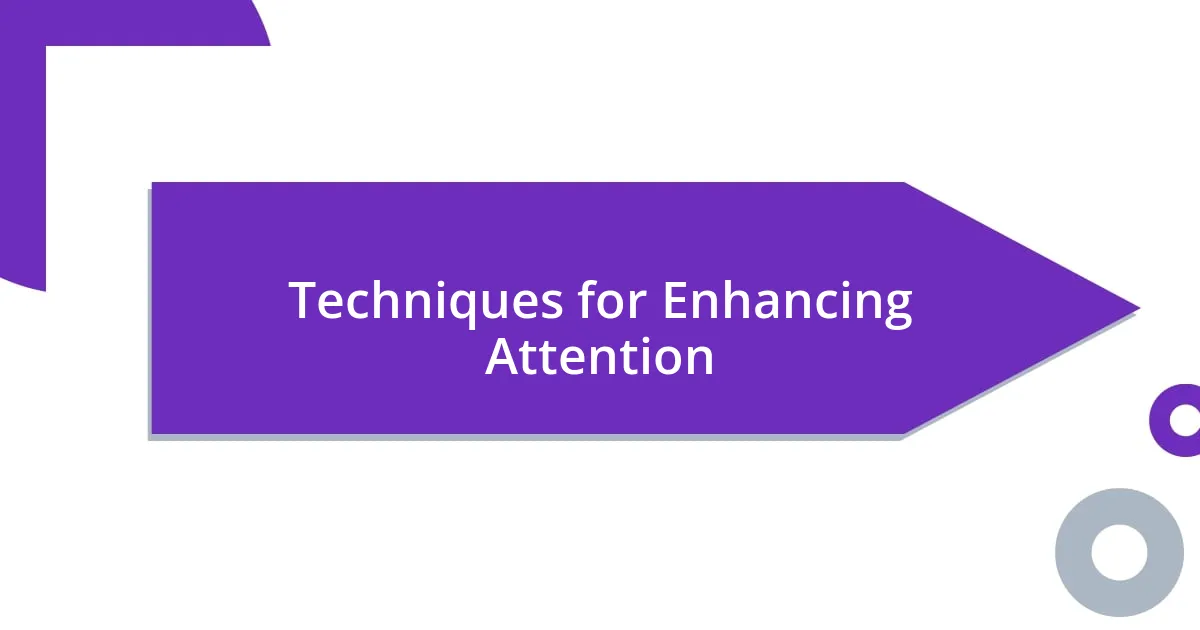
Techniques for Enhancing Attention
Enhancing attention in the detail-oriented journey comes down to a blend of techniques, and one that stands out is mindfulness. I remember practicing mindfulness during an intense editing session; I took a few moments to breathe deeply and focus on the task at hand. That brief pause helped me to tune out distractions and immerse myself fully in my work. Isn’t it fascinating how simply slowing down can actually speed up our productivity?
I also find that breaking tasks into smaller, focused intervals can work wonders. When I face a daunting project, I set a timer for 25 minutes of concentrated effort, followed by a 5-minute break. This method, known as the Pomodoro Technique, keeps me from feeling overwhelmed. Have you ever noticed how much easier it is to tackle something when you approach it in bite-sized pieces? Those short bursts of work often lead to breakthroughs in my attention and productivity.
Another effective technique is changing my environment. I once relocated my workstation to a quieter spot in my home during a particularly busy period. The shift helped eliminate background noise and distractions, allowing my mind to concentrate more effectively. The impact on my attention was palpable. If you’re struggling with focus, I encourage you to experiment with your surroundings—sometimes, a fresh setting can reignite your mental clarity in unexpected ways.
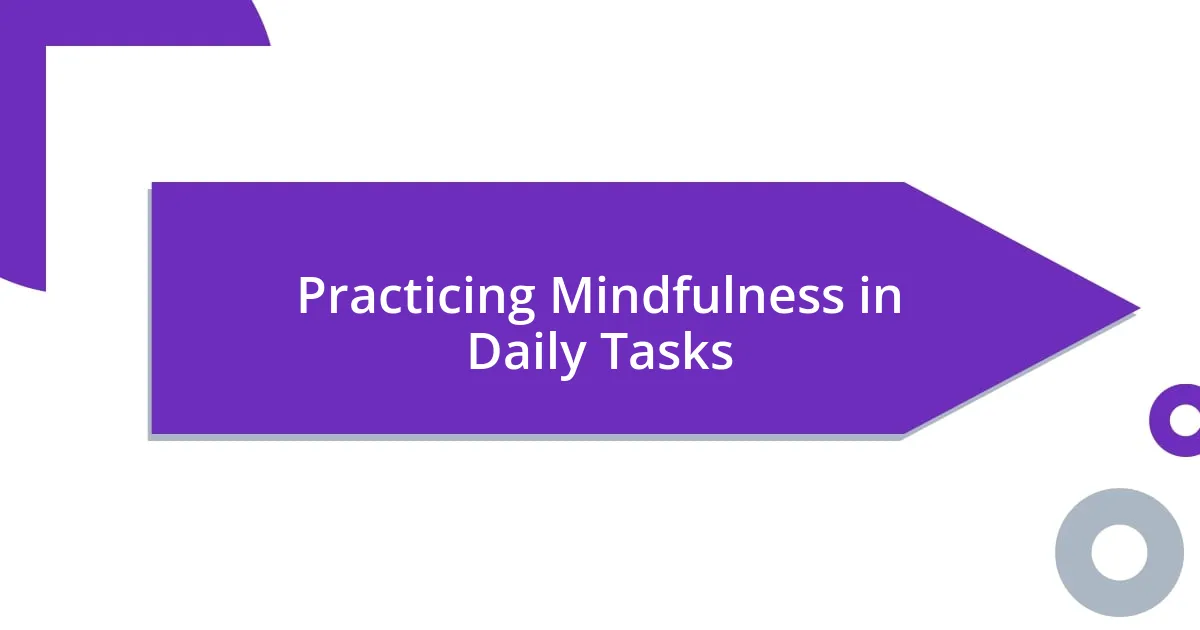
Practicing Mindfulness in Daily Tasks
Practicing mindfulness in daily tasks has profoundly changed how I approach my work. I recall a particularly hectic day when I felt overwhelmed by my to-do list. Instead of diving in headfirst, I took a few minutes to sit quietly, focus on my breath, and prioritize my tasks. This simple act of pausing transformed my chaotic energy into a clear sense of direction, reminding me of the importance of being present in the moment.
Have you ever noticed how a busy mind can distort your perspective? I’ve found that integrating mindfulness into even the smallest tasks can reshape this tendency. When washing dishes, I try to fully engage with the sensation of the warm water and the sound of the plates. This practice not only grounds me but also elevates a mundane chore into a moment of peace. It’s amazing how these little shifts can lead to a more mindful day overall.
I often practice mindfulness during my morning coffee ritual. Rather than multitasking, I take a moment to really savor each sip, allowing the rich flavors to awaken my senses. This intentional focus sets a positive tone for my day, making me more aware and engaged in whatever comes next. Mindfulness encourages me to slow down and enhances my appreciation for life’s simple pleasures. Have you tried something similar? The impact it can have on your daily routine might just surprise you.
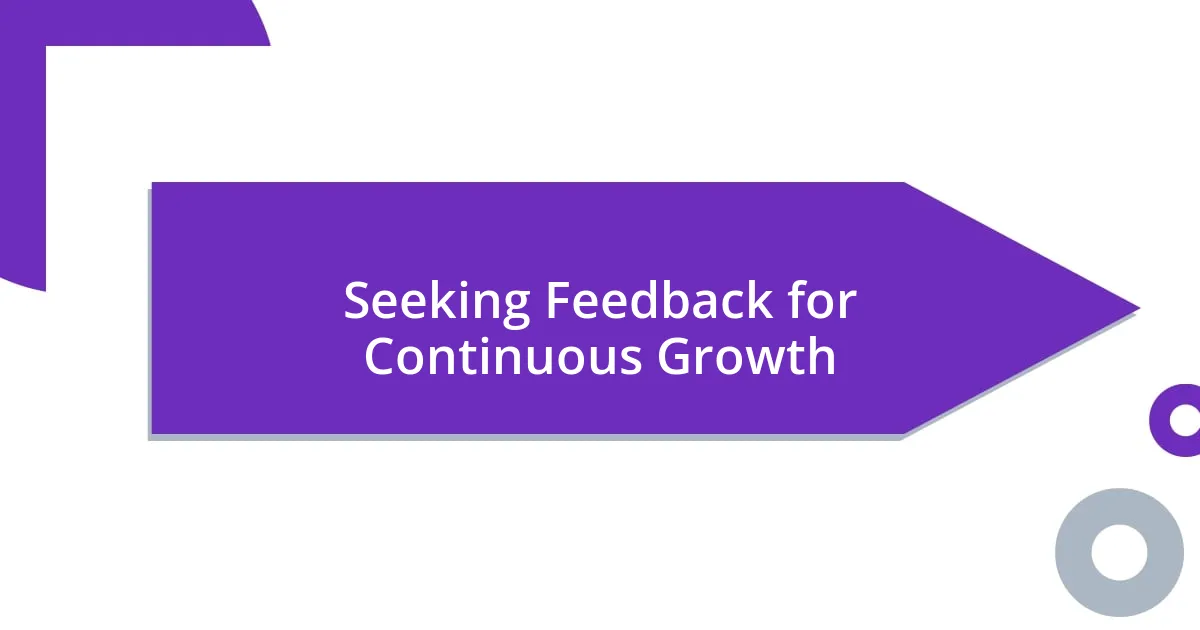
Seeking Feedback for Continuous Growth
Seeking feedback isn’t just a formality; it’s a pivotal part of my growth journey. I remember nervously sharing a project with a colleague, anticipating their critique. When they provided constructive feedback, I felt a mix of vulnerability and motivation. This experience taught me that genuine feedback opens the door to improvement, reshaping my perspective on my work.
Engaging with others for their insights helps me see blind spots I might overlook. Just last week, I received feedback on a presentation I thought was polished. A friend pointed out areas where my arguments could be clearer. Initially, I felt defensive, but deep down, I knew they were right. The clarity they offered wasn’t just helpful; it was essential for refining my delivery and ensuring my ideas resonated.
Sometimes, I find it helpful to solicit feedback from unexpected sources. I once asked my niece, who was only ten at the time, to review a creative work. Her honest, unfiltered perspective forced me to think differently. Isn’t it intriguing how fresh eyes can reveal insights that seasoned professionals might miss? This taught me that growth can come from anyone, regardless of their experience level.
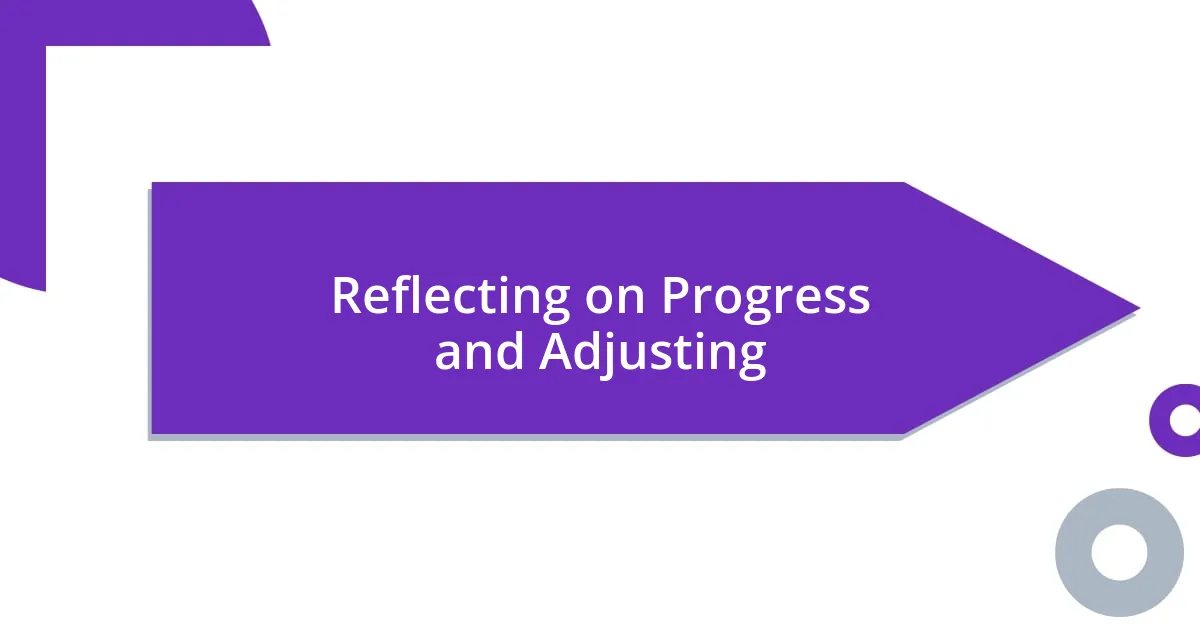
Reflecting on Progress and Adjusting
Reflecting on my progress is an essential habit I’ve cultivated over time. I like to set aside a few moments each week to jot down what I’ve accomplished and where I fell short. For instance, after completing a project, I often review the steps that led to my success but also note the missteps. This practice not only highlights my wins but also reveals areas that need adjustment, guiding my approach in future endeavors.
One specific moment stands out during my journey when I realized the importance of making adjustments. After completing a detailed report, I felt proud until I received mixed reactions during the team presentation. I took a step back and asked myself: What didn’t resonate? Analyzing the feedback lit a light bulb in me about tailoring my content more effectively to my audience’s preferences. Adjusting my communication style made a significant difference, proving that reflection isn’t just about noting what went well but also embracing the learning opportunities in setbacks.
I’ve come to understand that progress isn’t linear. It often resembles a winding path. Remember that time I ambitiously set a goal to enhance my organizational skills? Despite my excitement, I stumbled a few times when implementing new tools. Yet, every misstep taught me something valuable—like realizing that not every system works for everyone. So, I adjusted my methods, combining different techniques until I found a rhythm that suited me. Have you faced similar challenges? Embracing these twists and turns in the journey can lead to profound insights and growth.





